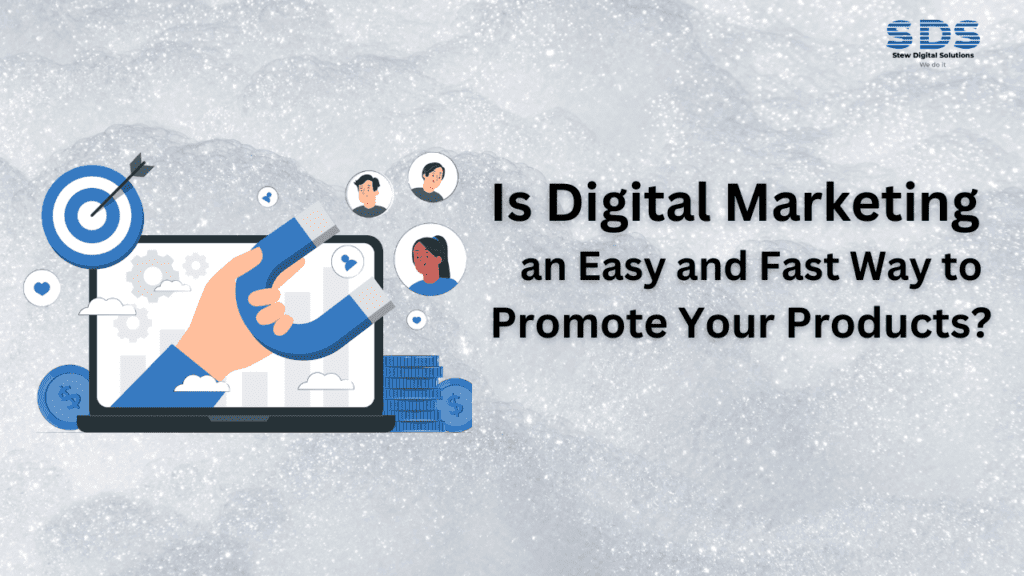Introduction
In the age of digital advancements and technological innovations, the way businesses promote their products and services has undergone a significant transformation. Traditional marketing methods have given way to an increasingly digital-marketing-driven landscape, where companies are utilizing various online platforms to reach their target audience. This shift has raised an important question: Is digital-marketing necessary for business? In this blog post, we will delve into the world of digital-marketing and explore its undeniable importance in today’s business realm.
One of the key advantages of digital marketing is its ability to expand a business’s reach beyond geographical boundaries. Unlike traditional marketing methods, which are often confined to a specific location or region, digital marketing offers a global platform. Through various digital channels such as social media, search engines, and email marketing, businesses can connect with potential customers across the world, breaking down barriers and opening up new market opportunities.
Moreover, digital marketing enables precise targeting of specific audiences. With data analytics and tools, businesses can gather insights about their target demographics, including age, gender, interests, and online behavior. Armed with this information, they can tailor their marketing strategies to deliver personalized messages, products, and services, resulting in higher conversion rates and customer satisfaction.
Expanding Reach and Targeting Specific Audiences

Cost-Effectiveness and Measurable Results

Compared to traditional marketing methods like print advertisements or TV commercials, digital marketing offers a more cost-effective solution for businesses, especially for small and medium-sized enterprises (SMEs). Digital campaigns can be tailored to suit various budgets, and businesses have the flexibility to adjust their strategies based on real-time data and performance metrics. This adaptability allows companies to allocate their resources more efficiently and optimize their marketing efforts to achieve maximum returns on investment (ROI).
Furthermore, digital marketing provides measurable results. Unlike traditional marketing, where it is challenging to accurately gauge the impact of an advertisement or campaign, digital marketing offers precise metrics and analytics. Businesses can track website traffic, conversion rates, click-through rates, customer engagement, and other key performance indicators (KPIs) to evaluate the effectiveness of their marketing initiatives. This data-driven approach empowers businesses to make informed decisions and refine their strategies for continuous improvement.
In the digital realm, building brand awareness and fostering customer engagement go hand in hand. Digital marketing offers numerous avenues for businesses to establish their brand identity and connect with their target audience on a deeper level.
Through social media platforms, businesses can interact with customers directly, respond to their queries, and build a community around their brand. Additionally, content marketing through blogs, videos, and infographics allows businesses to showcase their expertise, educate their audience, and establish themselves as thought leaders in their respective industries.
Digital marketing also enables businesses to leverage user-generated content, customer reviews, and testimonials to strengthen their credibility and reputation. Positive online reviews and recommendations can significantly impact a business’s reputation and influence potential customers in their decision-making process.
Building Brand Awareness and Customer Engagement

Staying Competitive in the Digital Era

In today’s digital era, businesses that fail to embrace digital marketing risk being left behind by their competitors. With more and more people relying on the internet for their purchasing decisions, businesses need to establish a strong online presence to remain competitive.
Digital marketing offers a level playing field for businesses of all sizes. It allows startups and SMEs to compete with established brands by utilizing targeted digital strategies. Moreover, digital marketing provides businesses with the agility to adapt to market trends quickly. With real-time data and insights, businesses can identify emerging opportunities, respond to customer demands, and stay ahead of the competition.
In a world where technology has revolutionized the way we communicate, interact, and consume information, digital marketing has become an indispensable tool for businesses. Its ability to expand reach, target specific audiences, cost-effectiveness, measurable results, and the potential to build brand awareness and customer engagement are just a few of the reasons why digital marketing is necessary for businesses today.
By embracing digital marketing strategies, businesses can effectively navigate the evolving digital landscape, connect with their target audience, and drive growth in an increasingly competitive marketplace. Ignoring the power of digital marketing may leave businesses struggling to reach their potential customers, lacking visibility, and falling behind their competitors. Therefore, in the digital age, embracing digital marketing is not just an option; it’s a necessity for businesses to thrive and succeed.
Conclusion



